Excavation Contractors Greenville
Top 10 Excavation Companies in Greenville
Receive up to 3 Excavation Contractors Near Me quotes for your project today! Compare profiles, reviews, accreditations, portfolio, etc... and choose the best offer.
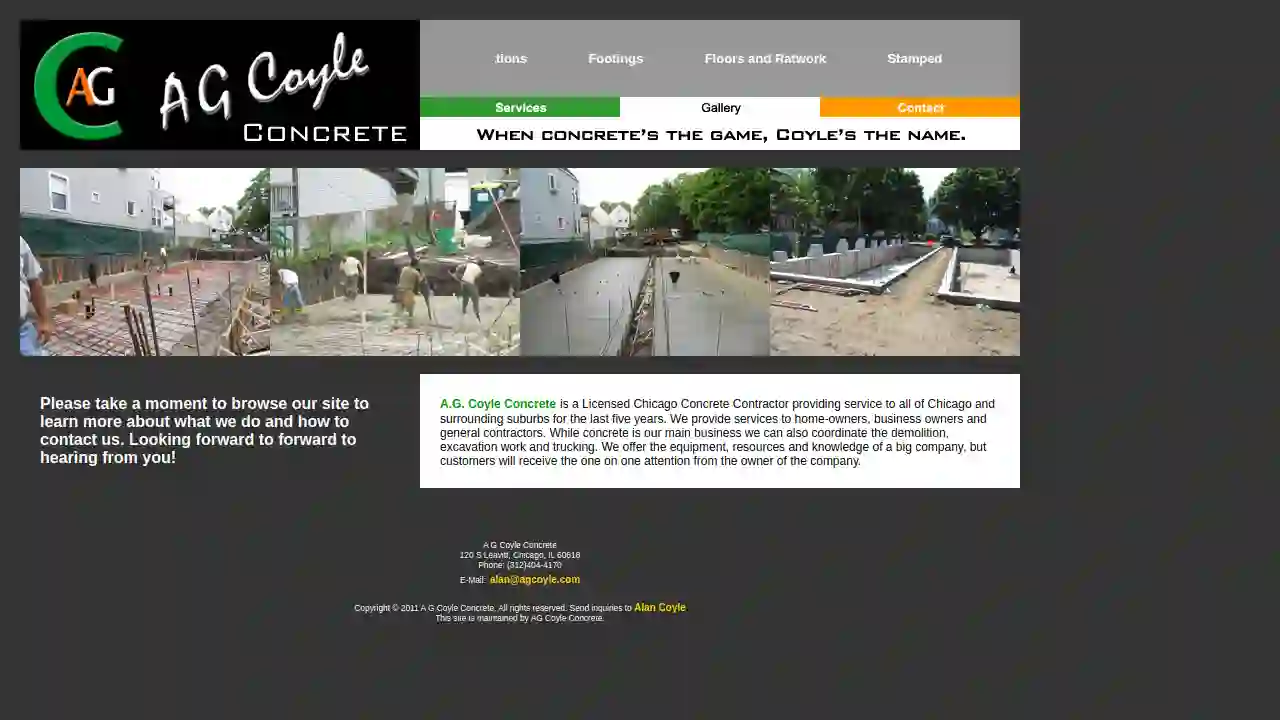
AG Coyle Concrete
120 S Leavitt, Chicago, 60618, USA.G. Coyle Concrete: Your Trusted Chicago Concrete Contractor A.G. Coyle Concrete is a licensed and experienced Chicago concrete contractor serving the city and its surrounding suburbs for the past five years. We are dedicated to providing top-notch concrete services to homeowners, business owners, and general contractors alike. While concrete is our core expertise, we also offer a comprehensive range of services, including demolition, excavation, and trucking. We bring the resources and knowledge of a larger company, but with the personalized attention you'd expect from a family-owned business.
- Services
- Why Us?
- Gallery
Get Quote
Always Underground Inc
3.316 reviews20603 Burl Court, 20603 Burl Ct, Joliet, 60433, USBuilding Trust with Quality Work Respected for our integrity, Gold Shovel Standard certified for safety About Us AUI is a full service Woman Owned Business, design build utility construction company specializing in wireless /wireline, aerial and underground projects. With over 60 years of experience AUI has been providing 24/7 emergency response to the most challenging of projects. Our design, build, turn-up and test teams are well positioned throughout Illinois, Indiana, Wisconsin, Michigan, Iowa, Ohio, Kentucky and eastern Missouri to be able to assist now. Our emergency response crews have mobilized to support storm damage and other natural disasters for decades. Please see our Services tab and check out our capabilities Working Together We offer an end-to-end client experience that includes seamless communication, budgeting, staffing, on-site organization, and solid, quality construction every time. Our relationships with over 80 jurisdictions in the Midwest provide our clients peace of mind their projects will be completed on time and on budget. Why Choose Us? We work with all stake holders to bring quality, infrastructure Projects to life. Call us today and bring our project management skills and extensive construction experience to your next project.
- Services
- Why Us?
- Gallery
Get Quote
K B Earthworks
54 reviewsGilmanton, USKB Earthworks: Your Trusted Partner for Excavation, Trucking, and Site Clearing in Central New Hampshire KB Earthworks is a locally owned and operated business serving the Lakes Region in Central New Hampshire. We're passionate about providing top-notch excavation, trucking, and site clearing services to both residential and commercial clients. With a wide range of heavy equipment and over 30 years of combined experience, we're equipped to handle projects of all sizes, from small-scale landscaping to large-scale land development. Our team is dedicated to delivering exceptional service, exceeding expectations, and ensuring customer satisfaction. We pride ourselves on our commitment to safety, quality, and efficiency. We work closely with our clients to understand their needs and provide customized solutions that meet their specific requirements. Whether you're looking to create a new driveway, clear land for a new construction project, or install a septic system, KB Earthworks is your one-stop shop for all your sitework needs. We're committed to providing our clients with the highest quality workmanship and exceptional customer service. Contact us today for a free consultation and estimate.
- Services
- Why Us?
- Testimonials
- Gallery
Get Quote
John Keno & Co
4.19 reviews8623 W Bryn Mawr Ave., Chicago, 60631, USJKC Overview Since 1946, John Keno & Company has provided world-class site preparation, excavating and shoreline development services throughout Chicagoland and along the shores of Lake Michigan. We are a third-generation, veteran-owned company with a deep commitment to safety, quality, and customer satisfaction. Our team of experienced professionals is dedicated to providing our clients with the highest level of service and expertise. Our Values Our values are the foundation of our success. We are committed to: World-class performance Serving as an excavation extension of your team Harnessing new technology to solve more problems
- Services
- Why Us?
- Gallery
Get Quote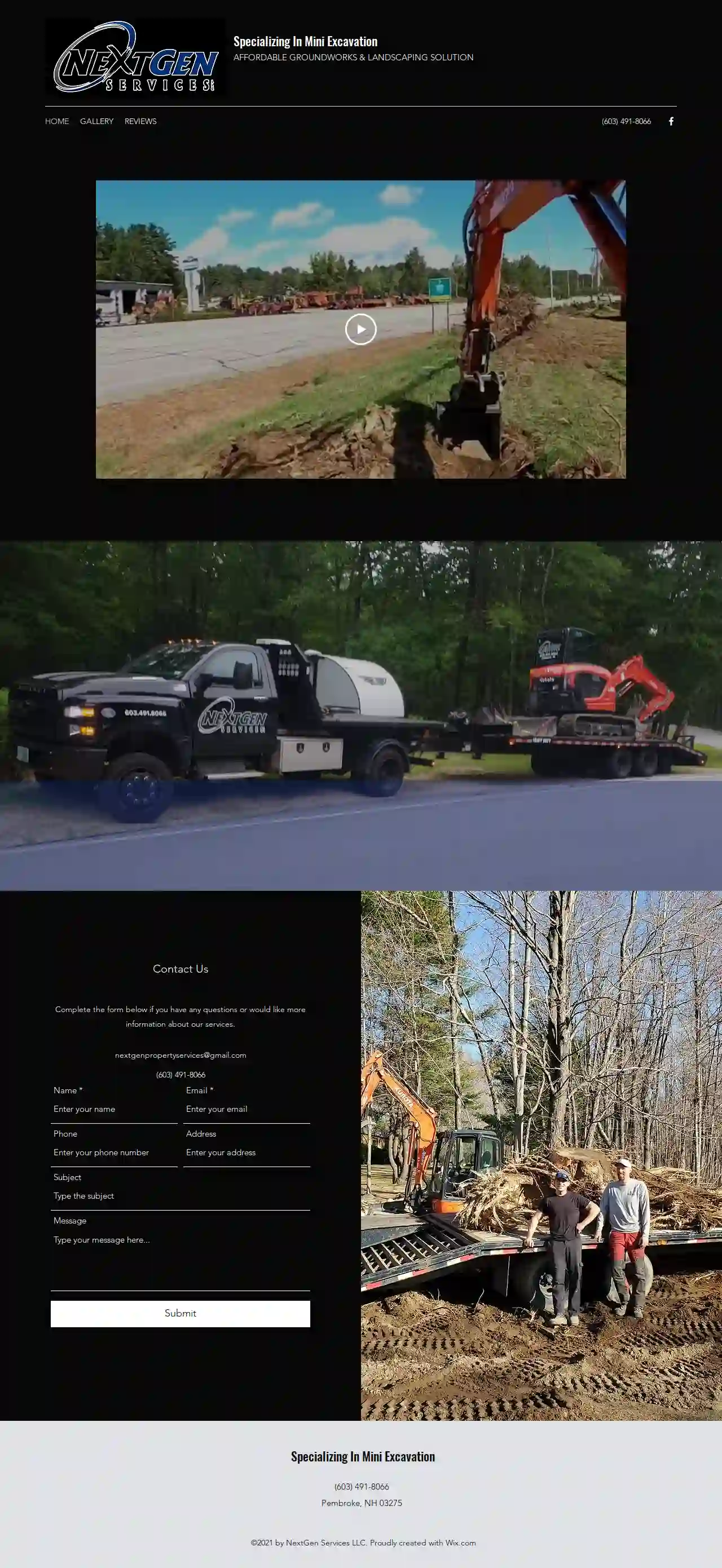
NextGen Services LLC
4.99 reviewsPembroke, 03275, USNextGen Property Services NH NextGen Property Services NH is a local business specializing in mini excavation and offering a wide range of groundworks and landscaping solutions. We are committed to providing affordable and high-quality services to our clients in Pembroke, NH and surrounding areas. Our team is dedicated to delivering exceptional results, exceeding expectations, and building lasting relationships with our clients. We take pride in our meticulous attention to detail and our commitment to customer satisfaction. Whether you need land clearing, stump removal, landscaping, parking pad construction, conduit trenching, estate cleanouts, brush removal, loam and mulch deliveries, or equipment transportation, we have the expertise and resources to handle your project efficiently and effectively. Contact us today to discuss your needs and receive a free estimate.
- Services
- Why Us?
- Gallery
Get Quote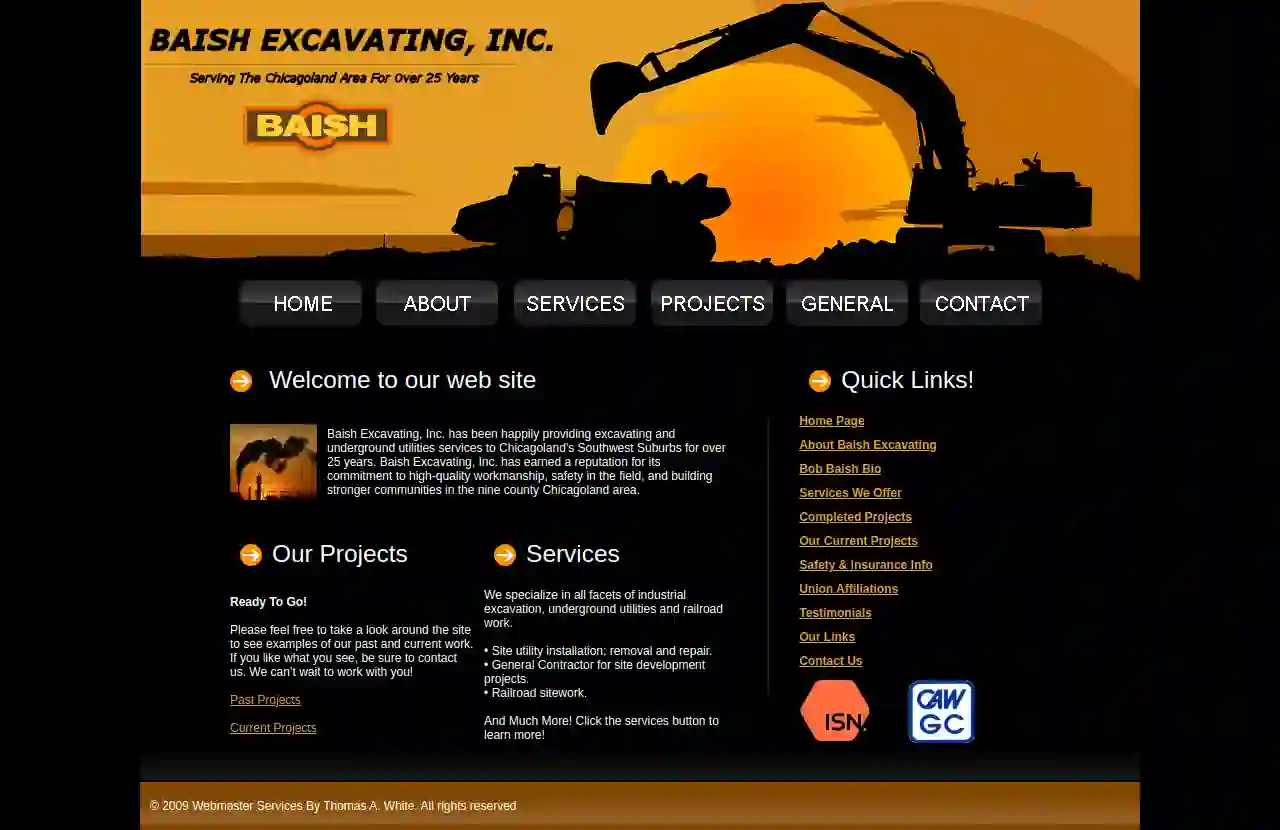
Baish Excavating, Inc.
3485-B Rt 126, Oswego, 60543, USBaish Excavating: Building Stronger Communities For over 30 years, Baish Excavating, Inc. has been a trusted name in Will County, Grundy County, and surrounding communities. A member of the Contractor's Association of Will and Grundy Counties since 1991, Baish Excavating, Inc. contributes to projects that build businesses, renovate the land and benefit the local economy. In 1985, Bob Baish founded Baish Excavating because he saw the need for high-quality excavating and underground utilities services in his community � an area that had the potential for immense residential and industrial growth. With that vision in mind, he rented a shop on Plainfield-Naperville Road in Plainfield, Illinois with a modest crew of three men (one of which was Bob�s dad, Art) and four machines. Today, the shop has upgraded in size and houses 35 pieces of machinery. The crew and staff has expanded along with the size of the workload, but the same old work ethic applies: Baish Excavating, Inc. is committed to building stronger local communities, one job at a time.
- Services
- Why Us?
- Our Team
- Testimonials
- Gallery
Get Quote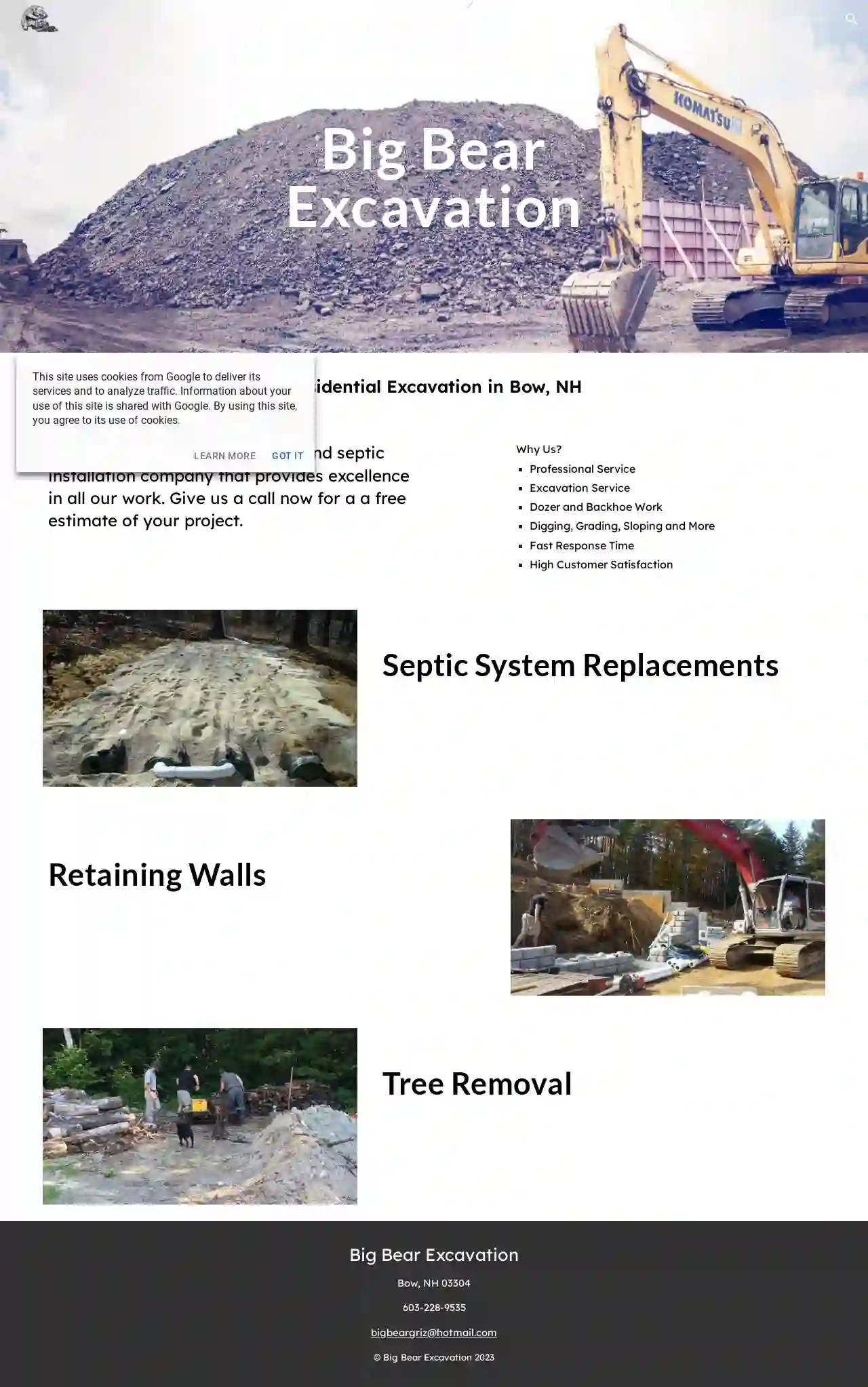
Big Bear Excavation
51 reviewsBow, 03304, USBig Bear Excavation We are a residential excavation and septic installation company that provides excellence in all our work. Give us a call now for a free estimate of your project. Why Us? Professional Service Excavation Service Dozer and Backhoe Work Digging, Grading, Sloping and More Fast Response Time High Customer Satisfaction Septic System Replacements Retaining Walls Tree Removal
- Services
- Why Us?
- Gallery
Get Quote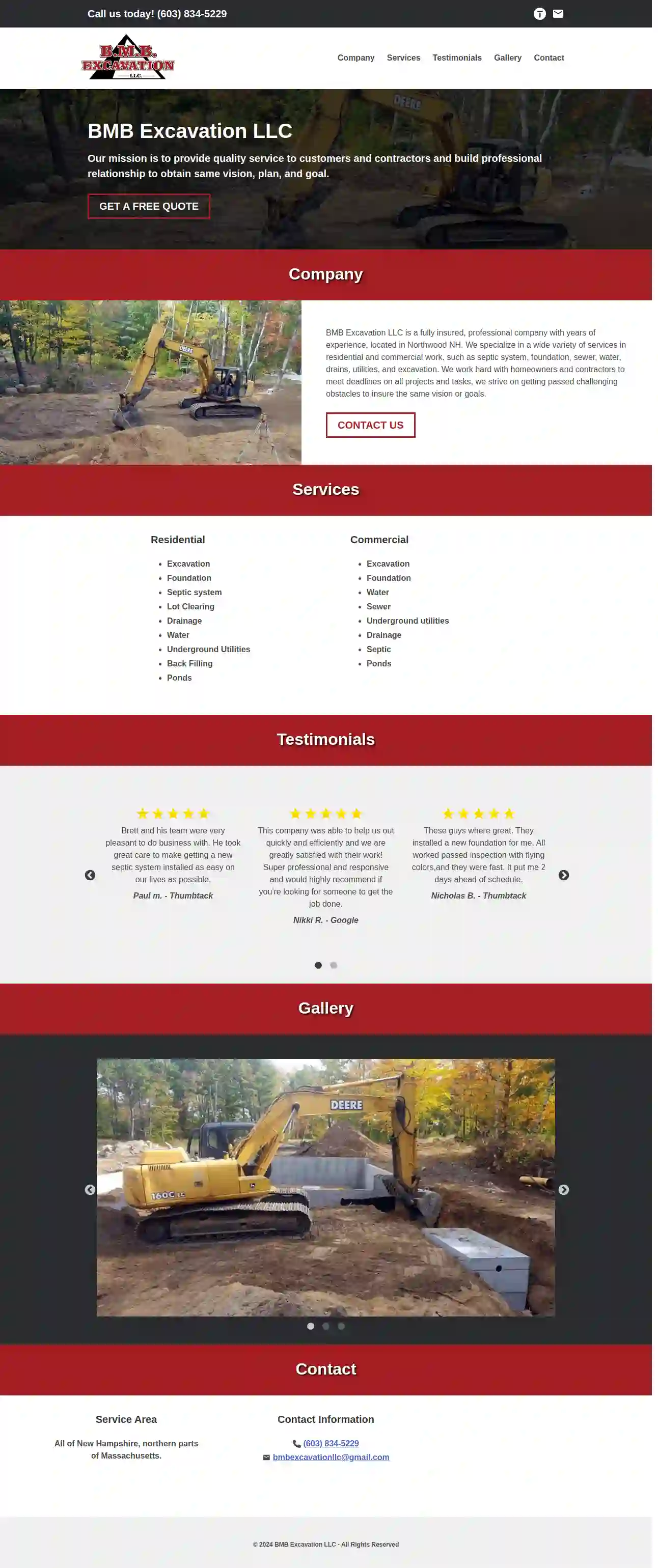
BMB Excavation LLC
44 reviewsNorthwood, USBMB Excavation LLC BMB Excavation LLC is a fully insured, professional company with years of experience, located in Northwood NH. We specialize in a wide variety of services in residential and commercial work, such as septic system, foundation, sewer, water, drains, utilities, and excavation. We work hard with homeowners and contractors to meet deadlines on all projects and tasks, we strive on getting passed challenging obstacles to insure the same vision or goals. Our mission is to provide quality service to customers and contractors and build professional relationship to obtain same vision, plan, and goal.
- Services
- Why Us?
- Testimonials
- Gallery
Get Quote
Northern Home & Excavation, LLC
535 reviewsRollinsford, NH, 03869, USLET US LEVEL YOUR LAND Don't pass on a fantastic piece of property in a great location just because it has hills or a big slope. Any piece of ground can be transformed into the perfect place for building thanks to the excavation services provided by Northern Home & Excavation, LLC. Our excavating business will properly level and prepare your property for your next project. To find out how we can help with your project or construct a patio in Dover & Barrington, NH, York & Eliot, ME, or the surrounding 40-mile radius, contact us now. We provide a variety of services, including clearing land, footing installation, culvert installation, outbuilding preparation, septic tank preparation, foundation excavation, foundations for garage and home additions, and more. WE'RE INSURED TO HANDLE A WIDE RANGE OF PROJECTS You Don't Have To Worry About Subcontractors With Us PREPARE YOUR LAND PROPERLY HIRE OUR EXCAVATING CONTRACTOR IN DOVER & BARRINGTON, NH AND YORK & ELIOT, ME AND SURROUNDING AREAS "Our company philosophy is to not only just do your job, but do it well enough so you feel compelled to refer anyone you know that needs excavation work!" NH Areas: Portsmouth, New Castle, Dover, Rollinsford, Barrington, Madbury, Durham, Stratham, Exeter, Somersworth, Rochester, New Market, Newington, Hampton, North Hampton, Rye, Strafford, Exeter, Somersworth, Rochester, New Market, Newington, Hampton, North Hampton, Rye, ME areas: York, Elliot, Kittery, Berwick
- Services
- Why Us?
- Testimonials
- Gallery
Get Quote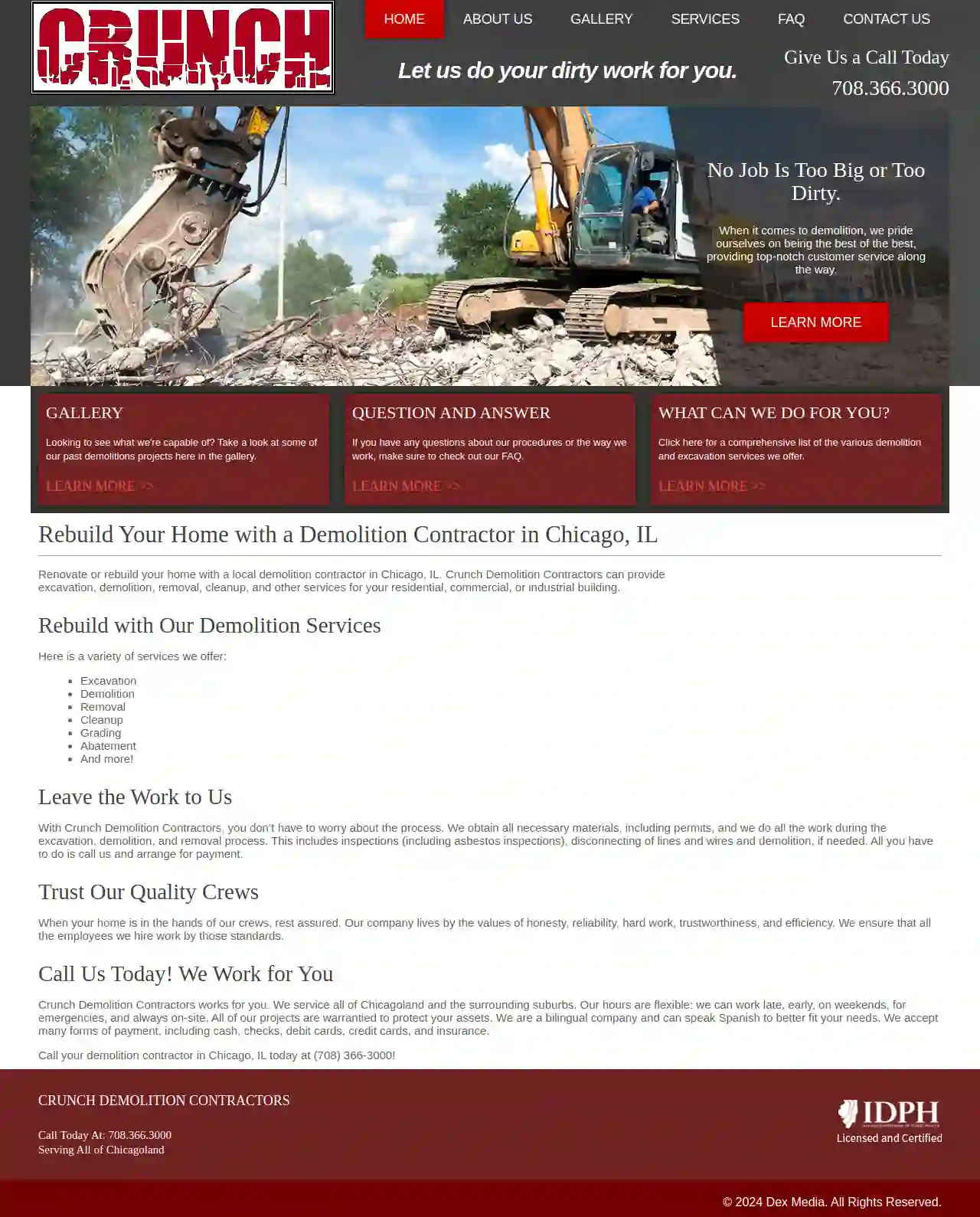
Crunch Demolition Contractors
11 reviewsChicago, USCrunch Demolition Contractors: Your Trusted Demolition Experts in Chicago, IL Crunch Demolition Contractors has been serving the Chicagoland area since 1997, specializing in demolition removal and hauling, particularly in the Oak Park, IL area. We take pride in providing top-notch customer service and affordable rates, making us a leading demolition company in the community. Our mission is to consistently deliver high-quality service from start to finish. We are committed to providing the most valuable demolition work in the Chicagoland area. Whether you need a garage demolished, a building torn down, or any other demolition or excavation project, our team of skilled technicians and top-of-the-line equipment are ready to handle the job efficiently and effectively. We understand that demolition projects can be stressful, which is why we handle all the details for you. We obtain all necessary permits, disconnect lines and wires, and conduct thorough inspections, including asbestos inspections. Our team is dedicated to providing a seamless and hassle-free experience for our clients. At Crunch Demolition Contractors, we value honesty, reliability, hard work, trustworthiness, and efficiency. These values are reflected in every aspect of our work, from our initial consultation to the final cleanup. We are a bilingual company, fluent in both English and Spanish, ensuring clear communication and understanding with our clients. We are committed to providing exceptional service and exceeding your expectations. Contact us today for a free estimate and let us handle your demolition needs with expertise and care.
- Services
- Why Us?
- Gallery
Get Quote
Over 22,076+ Excavation Pros on our platform
Our excavation providers operate in Greenville and surroundings!
ExcavationHQ has curated and vetted the Best Excavation Businesses near Greenville. Find a reliable business today.
Frequently Asked Questions About Excavation Contractors
- Project Size and Scope: The larger and more complex the excavation, the higher the cost.
- Soil Type: Different soil types require different equipment and techniques, impacting costs. Rocky or clay-rich soil can be more expensive to excavate than loose soil.
- Accessibility: Difficult-to-access sites might require specialized equipment or additional labor, increasing expenses.
- Disposal Costs: Hauling away excavated material (soil, rocks, etc.) to disposal sites incurs additional fees.
- Permits and Inspections: Depending on local regulations, permits and inspections might be required, adding to the overall cost.
- Determine the Area: Measure the length and width of the area you want to fill. Multiply them to get the area in square feet (or meters).
- Determine the Depth: Measure the difference between the existing grade and the desired grade (how much you need to raise the ground). This is the depth of fill required.
- Calculate Volume: Multiply the area (step 1) by the depth (step 2) to get the volume in cubic feet (or meters).
- Account for Compaction: Fill dirt compacts when it settles, so add 10% to 25% to the calculated volume to account for compaction. The exact percentage depends on the type of fill material.
- Clear the Area: Remove any obstacles, including vehicles, outdoor furniture, landscaping features, or structures, from the excavation zone and surrounding area.
- Mark Existing Features: Identify and mark underground utilities, septic tanks, sprinkler systems, or other buried elements you want to protect.
- Protect Landscaping: Use tarps or fencing to shield trees, shrubs, gardens, or other landscaping elements from damage.
- Provide Access: Ensure the excavation contractor has clear access to the work area, including gates wide enough for equipment.
- Discuss Logistics: Coordinate with the contractor regarding parking arrangements, material delivery, and any special instructions or concerns you might have.
- New Construction: Laying foundations, basements, or underground utilities for new buildings.
- Home Additions: Creating space for new rooms, basements, or extensions.
- Landscaping: Leveling ground, creating slopes, installing retaining walls, or digging for ponds or pools.
- Drainage Improvement: Installing French drains, drainage ditches, or swales to manage water runoff.
- Utility Installation or Repair: Laying new water, sewer, gas, or electrical lines, or repairing existing ones.
- Demolition: Clearing debris and preparing the site after demolishing a structure.
How much does excavation cost?
How do I calculate how much dirt I need for fill?
How do I prepare my property for excavation?
How do I know if I need excavation for my project?
How much does excavation cost?
- Project Size and Scope: The larger and more complex the excavation, the higher the cost.
- Soil Type: Different soil types require different equipment and techniques, impacting costs. Rocky or clay-rich soil can be more expensive to excavate than loose soil.
- Accessibility: Difficult-to-access sites might require specialized equipment or additional labor, increasing expenses.
- Disposal Costs: Hauling away excavated material (soil, rocks, etc.) to disposal sites incurs additional fees.
- Permits and Inspections: Depending on local regulations, permits and inspections might be required, adding to the overall cost.
How do I calculate how much dirt I need for fill?
- Determine the Area: Measure the length and width of the area you want to fill. Multiply them to get the area in square feet (or meters).
- Determine the Depth: Measure the difference between the existing grade and the desired grade (how much you need to raise the ground). This is the depth of fill required.
- Calculate Volume: Multiply the area (step 1) by the depth (step 2) to get the volume in cubic feet (or meters).
- Account for Compaction: Fill dirt compacts when it settles, so add 10% to 25% to the calculated volume to account for compaction. The exact percentage depends on the type of fill material.
How do I prepare my property for excavation?
- Clear the Area: Remove any obstacles, including vehicles, outdoor furniture, landscaping features, or structures, from the excavation zone and surrounding area.
- Mark Existing Features: Identify and mark underground utilities, septic tanks, sprinkler systems, or other buried elements you want to protect.
- Protect Landscaping: Use tarps or fencing to shield trees, shrubs, gardens, or other landscaping elements from damage.
- Provide Access: Ensure the excavation contractor has clear access to the work area, including gates wide enough for equipment.
- Discuss Logistics: Coordinate with the contractor regarding parking arrangements, material delivery, and any special instructions or concerns you might have.
How do I know if I need excavation for my project?
- New Construction: Laying foundations, basements, or underground utilities for new buildings.
- Home Additions: Creating space for new rooms, basements, or extensions.
- Landscaping: Leveling ground, creating slopes, installing retaining walls, or digging for ponds or pools.
- Drainage Improvement: Installing French drains, drainage ditches, or swales to manage water runoff.
- Utility Installation or Repair: Laying new water, sewer, gas, or electrical lines, or repairing existing ones.
- Demolition: Clearing debris and preparing the site after demolishing a structure.